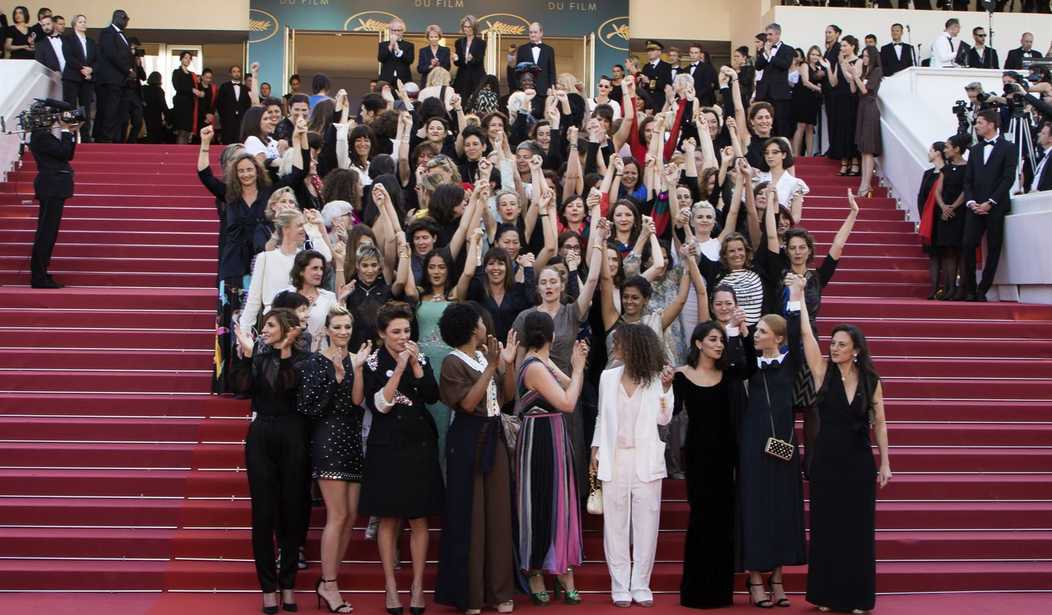After a shameful night of failed self-adulation this weekend the Hollywood elitists managed to come away looking all the more worse for designer wear. It was as if the lights had been turned up too high and the sequined gowns were exposed as bedazzled off-the-rack fashions. The end result of the Oscars was that in an unintentional manner there was an exposure of the failings of this very industry as a social leader.
Sunday’s telecast of the 93rd Academy Awards was a fiasco any way you look at it. Due to the pandemic it was a logistical nightmare, they had science-defying standards for the show, and the ceremony was a head-shaking affair of confusion. (I covered the fiasco live, at RedState.) This led to an amazingly horrible ratings result, where the show came in from last year’s historic low with an audience that was -60% lower than that embarrassing figure.
The producers even bungled their presentation formula. They were so assured that the recently departed Chadwick Bosman would win a posthumus Best Actor award that they moved Best Picture up from its customary closing position. This was done in order to end the night with a heartfelt moment and underscore the diversity of the awards at the same time. However there was an upset in the works, as Anthony Hopkins was announced the winner, and he was not in attendance, so the show basically just stopped.
Of course there was a fair amount of activist speechifying throughout the night, but with an alteration. The past few Oscars during the Trump years were filled with invective about the immigration policy in the country. Yet as that issue has managed to get worse over the past few months, the new President is actually seen as a favored and competent figure (I know, but these folks traffic in fiction, remember). That means there would be no mention of that problem at all, so guns and police bias were all the rage.
Recommended
Before presenting for Best Supporting Actor actress Laura Dern gave time to speak of the power of cinema, noting how films this year are addressing equity and diversity. This is where things become exposed, showing the vacant promises that film can change us as a nation. This revelation begins by looking throughout the categories and you see titles that were placed firmly in the activist categories, while set in previous eras.
“Judas and the Black Messiah” concerns the early days of the Black Panther movement. “The Trial of the Chicago 7“ centered on 1960s radical activism. ‘’One Night In Miami’’ concerned four black celebrity figures grappling with social change in 1964, and “Ma Rainey’s Black Bottom“ was a 1930s-era study of race issues. This is where a dawning starts to come over the proceedings. These issues are seen as a generational concern, something that has been experienced over the decades in this country. Now you need to be oblivious to think that many of the topics of deep concern displayed in films such as these have not improved over those decades.
Hollywood, it has been proven, is in possession of just such obliviousness.
These celebrities and studios are still selling the claim that racial oppression is just as intense as always, but this exposes them now in two ways. First, they need to have these problems highlighted in order to be seen as a valid voice of concern, giving us all the corrective instructions and lecturing the rabble in this country on the proper way to live our lives. But here is the disqualifying aspect. If our current society is just as bad as portrayed in these films, and the lectures from the lectern on Sunday are at all accurate, this means that the claim that film can help solve our problems is complete garbage. Where are the results, in other words, if things have not improved over the last half century?
This hollow boast that cinema is the source for guiding us out of the morass of social inequity is completely compromised by the fact that there is no evidence that this has ever occurred. The message is completely undercut by those delivering the message, because if these problems still exist then motion pictures have failed in your claim that they will solve those same problems.
That is the kind of paradox that would make for a great plot twist in a screenplay.

























Join the conversation as a VIP Member